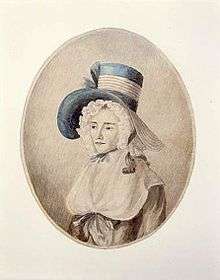Elizabeth Simcoe
| Elizabeth Simcoe | |
|---|---|
 portrait by Mary Anne Burges | |
| Born |
Elizabeth Posthuma Gwillim September 22, 1762 Whitchurch, Herefordshire |
| Died |
January 17, 1850 (aged 87) Honiton, Devon |
Elizabeth Posthuma Simcoe (22 September 1762 – 17 January 1850) was a British artist and diarist in colonial Canada. She was the wife of John Graves Simcoe, the first Lieutenant Governor of Upper Canada.
Biography
She was born Elizabeth Posthuma Gwillim in the village of Whitchurch, Herefordshire, England, daughter of Lieutenant Colonel Thomas Gwillim and Elizabeth Spinckes. Her father died before her birth, and her mother died shortly afterwards. After her baptism, which was on the same day as her mother's burial, she was taken into the care of her mother's younger sister, Margaret. In commemoration of her posthumous birth, Elizabeth was given the middle name Posthuma. Her adopted mother, Margaret, married Admiral Samuel Graves on 14 June 1769 and she grew up at Graves's estate, Hembury Fort near Honiton in Devon. Gwillim was part of a group of friends that included Mary Anne Burges in Honiton.[1]
On 30 December 1782, Elizabeth married John Graves Simcoe, Admiral Graves' godson. They had four daughters and one son, Francis Simcoe, for whom they named Castle Frank. Katherine Simcoe, their only daughter to be born in Upper Canada, died in childhood of pneumonia; she is buried at Fort York Garrison.
Elizabeth was a wealthy heiress, who acquired a 5,000 acre estate near Honiton in Devon and built Wolford Lodge. Wolford was the Simcoe family seat until 1923.[2] She is buried at Wolford Chapel.
Legacy
Elizabeth Simcoe left a diary that provides a valuable impression of life in colonial Ontario. First published in 1934, there was a subsequent transcription published in 1965 and a paperback version issued at the turn of the 21st century, more than 200 years after she wrote it. Her legacy also includes a series of 595 watercolour paintings that depict the town of York, Upper Canada. She was responsible for the naming of Scarborough, an eastern Toronto district, after Scarborough, England. The townships of North, East and West Gwillimbury, just south of Lake Simcoe in central Ontario, are also named for the family. The Township of Whitchurch (today the Town of Whitchurch–Stouffville, Ontario), was named in honour of her place of birth.[3] In December 2007, a statue of Elizabeth Gwillim Simcoe was erected in the town of Bradford West Gwillimbury, while commemorating the 150th anniversary of the town's incorporation. The statue is located in a parkette in front of the Bradford post office at the corner of John Street West and Barrie Street.
References
- ↑ The Progress of the Pilgrim Good-Intent, in Jacobinical Times, Mary Ann Burges, AbeBooks, retrieved 2 August 2014
- ↑ Dictionary of Canadian Biography SIMCOE, JOHN GRAVES
- ↑ Jean Barkey, et al., Whitchurch Township (Toronto: Stoddart, 1993), 14.
| Wikimedia Commons has media related to Elizabeth Simcoe. |
- Firth, Edith G. (1988). "Elizabeth Posthuma Gwillim". Dictionary of Canadian Biography, vol. VII. Toronto. ISBN 0-8020-3452-7.
- Bassett, John M. (1974). The Canadians: Elizabeth Simcoe, First Lady of Upper Canada. Don Mills: Fitzhenry & Whiteside Ltd. ISBN 0-88902-204-6.
- Frayer, Mary Beacock (1989). Elizabeth Posthuma Simcoe, 1796–1850: A Biography. Toronto: Duncan Press.
- Innis, Mary Quayle (1965). Mrs. Simcoe's Diary. New York: St. Martin's Press.
- Robertson, J. Ross (1934). The Diary of Elizabeth Simcoe. Toronto: The Ontario Publishing Company Limited.
- Travels With Elizabeth Simcoe. Archives of Ontario.
